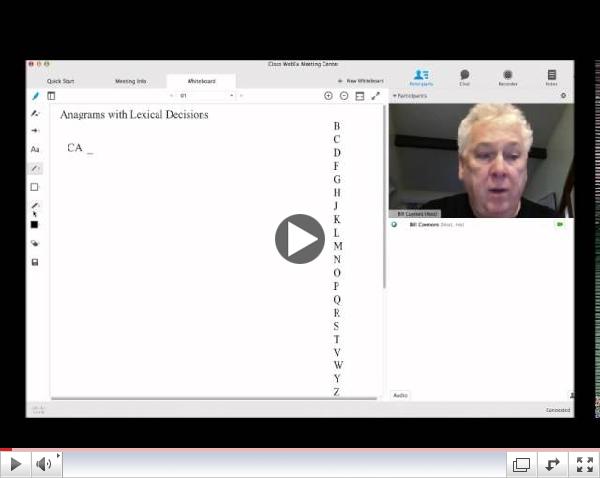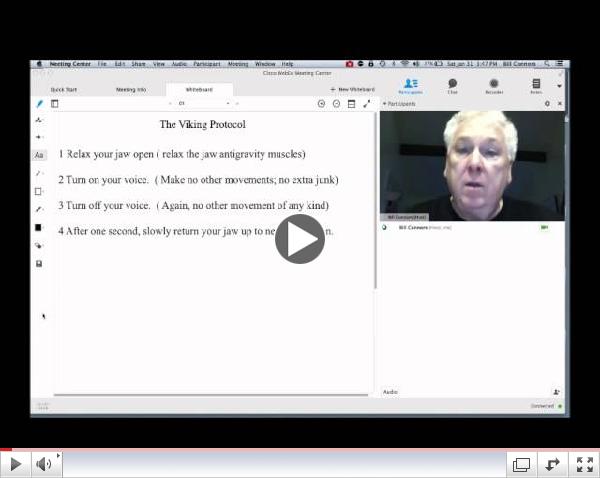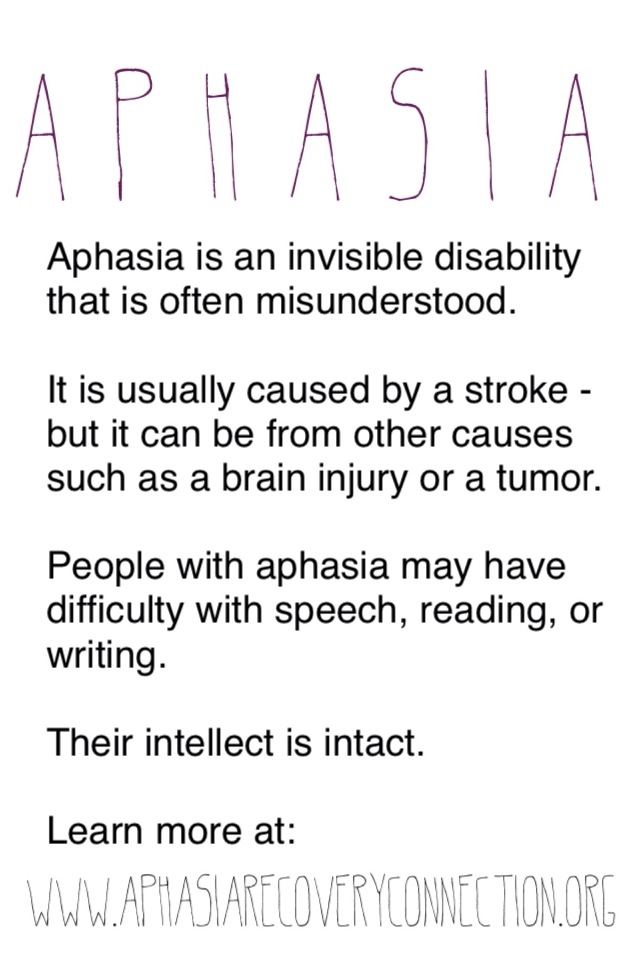FREE Protocol for Aphasia
Editor's Note:
The Anagrams with Lexical Decisions exercise is part of the Brain Compatible Aphasia Treatment program. In his video - seen below, Bill discusses this exercise.
 | | Bill Connors discusses Anagrams with Lexical Decisions. (BCAT) Time: 3:17 |
The goal of this protocol is to help the person recovering from aphasia reconnect their ability to think of words that are spelled, decide if they are real words, and then activate the meanings for that word. This can be a powerful treatment and practice activity as its involves the mental activation of sounds and related spellings with word meanings involved in the word recall process. Having the PRA mentally assemble and then hold active the spellings and words facilitates the rewiring of the brain.
Click here for the protocol.
For more information:
If you have questions about how Aphasiatoolbox.com can help you and your aphasia, please contact us or call us at 724-494-2534.
|
FREE Protocol for Apraxia and Dysarthria
Editor's Note:
The Viking protocol is part of the Aphasiatoolbox Motor Reconnect Apraxia Program.
 | Bill Connors discusses The Viking Protocol (MRAP)
Time: 3:47 |
According to Bill Connors, the Viking protocol is designed to help people with apraxia reconnect control over voicing and phonation. Quite frequently, apraxia impairs a person's ability to control the movement of the vocal folds in order to create speech sounds, initiate speech, and use
syllables which are the building blocks of connected speech production.
Click here for the full protocol.
For more information:
If you have questions about how Aphasiatoolbox.com can help you and your apraxia or dysarthria, please contact us or call us at 724-494-2534.
|
FEATURE: Current Clinical Trials for Aphasia and related disorders
ClinicalTrials.gov is a Web-based resource that provides patients, their family members, health care professionals, researchers, and the public with easy access to information on publicly and privately supported clinical studies on a wide range of diseases and conditions. We've listed here some current trials that are now recruiting subjects.
> Apraxia of Speech:
> Dysarthria:
> Cognitive Impairment/Rehabilitation
|
NEWS on Aphasia and related disorders
|
CENTER PROFILE: MorseLife Aphasia Center, West Palm Beach, FL
The MorseLife Aphasia Center
offers a program to foster communication skills for people with aphasia and brain injury. Their ten-week program includes computer training, speech therapy, and communication support.
The Center's schedule is:
- Monday and Wednesday, 10 am to 12 Noon
- Tuesday and Thursday, 12:30 pm to 2:30 pm
The Center offers a separate program for Caregivers on Fridays, at 10 am to 12 noon.
For additional information, please contact Cathy Feld, at 561-301-2909; her email is [email protected].
You can also contact the MorseLife Aphasia Center directly at 561-209-6174.
|
Editor's Note:
BL is an aphasiatoolbox client who currently lives in Malaysia. Since his stroke about 4 1/2 years ago, he has been using telepractice to recover his speech and his writing. Here, we include two narratives that he recently completed.
1. Thanksgiving - Compare and Contrast:
In the United States, Thanksgiving is a wonderful holiday time. In Malaysia, where we live, Thanksgiving is not a holiday; it's a regular work day.
At a holiday like Thanksgiving, people - friends and family, come together. Just like in the United States, we also came together for Thanksgiving.
Rather than Thursday, we have our Thanksgiving dinner on Friday; we also eat turkey, stuffing and pie. In total, we had nine people for our thanksgiving dinner in Malaysia.
And, just like in the United States, we give thanks for all we have.
2. Christmas Time - Compare and ContrastChristmas time is a special time of year. Festivities and cheer are celebrated all around the world.My family and I live in Malaysia. In Malaysia, we have more time to get ready for Christmas since we do not celebrate Thanksgiving.
In contrast to Malaysia, Christmas time in the United States can be a little crazy! People tend to be rushed at this time of the year. We are more relaxed in Malaysia.
One of the things that we like do at this time of the year is have a real Christmas tree. When we lived in Oregon, we chopped our own Christmas tree. In Malaysia, we have a fake Christmas tree.
For me, a Christmas tree , whether real or fake, is a symbol of light, renewal, festivity, and cheer. And, Christmas is a time of joy because we have God's thanks for our friends and our health.
|
|
|
|
|
"Aphasia, and for that matter apraxia and dysarthria, are all different for each person requiring different, VERY DIFFERENT work."- Bill Connors
January 31, 2015 |
|
January 2015 - Aphasia and Related Disorders
|
|
|
This is Sharon Rennhack, the chief editor for the aphasiatoolbox newsletter. We hope you've enjoyed your holidays, and have returned feeling refreshed and renewed!
For our January 2015 edition, we are looking at the root of our work at aphasiatoolbox.com, specifically:
- Aphasia, Apraxia, and Dysarthria
In addition to our feature articles covering aphasia and related disorders, we also include:
- FREE protocols to help these disorders.
Aphasiatoolbox offers the Brain Compatible Aphasia Treatment (BCAT) program and the Motor Reconnect Apraxia Program (MRAP); together, these programs offer a complete practice and treatment regimen for people with aphasia, apraxia that affects speech, and dysarthria.
- current research & clinical trials, aphasia news
Sharon Rennhack
Chief Editor
Aphasiatoolbox
|
FEATURE: What is Aphasia, Apraxia and Dysarthria?
Editor's Note:In this month's edition of aphasiatoolbox, we are discussing aphasia and related disorders, including apraxia that affects speech, and dysarthria. These problems can be separate or can occur concomitantly in people who have brain injuries from stroke or TBI.
- Aphasia is a language problem;
- Apraxia is a motor planning problem;
- Dysarthria is a speech problem.
Read our detailed articles:
|
FEATURE: The Role of Cognition and Metacognition in Aphasia Therapy and Recovery
As many of you know, I had a stroke in 2010, and a second one in 2013. The first stroke caused my aphasia but also created issues in memory, word recall and semantics, writing, thought process and cognition. Those first 6 months were difficult because I had lost my sense of self when I lost my speech. In order to maximize my recovery to do things like create this newsletter edition, I needed to significantly improve, perhaps to normal levels, those cognitive skills.
According to the National Aphasia Association, aphasia is "an acquired communication disorder that impairs a person's ability to process language, but does not affect intelligence." This poster from The Aphasia Recovery Connection states that "intellect is intact."
 This speaks to the question of what does loss or impairment of cognitive skills mean? How does that loss correlate with retention of intellect and intelligence? At first blush, that sounds contradictory but in reality, it is not.
There are many definitions of intellect and likewise many ideas about what mental processes and skills comprise intellect. What we have come to understand is that it is not an issue of losing intellect or intelligence, but rather how the skillful treatment plan addresses the the remediation of cognitive impairments.
Both words - intellect and intelligence, are related to cognition, which refers to the mental processes involved in gaining knowledge, understanding, learning and comprehension. These processes include thinking, knowing, remembering, judging, and problem-solving. These are all higher-level functions of the brain and include language, imagination, perception, and planning.
The external evidence and research is clear - stroke and brain injury affect cognition, both symbolic language and cognitive skills such as working memory; attention; procedural memory; and cognitive flexibility.
As Bill Connors says, "Aphasia treatment should target appropriate mental processes to maximize aphasia recovery. Taking advantage of neuroplasticity requires addressing problems with cognitive skills. The GOOD news is that a rising tide lifts all boats. Improving cognition in effective ways will facilitate language recovery. So, the better you think the better you will talk."
Be sure to ask your speech pathologist to explain to you what your mental process targets are and why they were chosen. She will be glad you did.
At aphasiatoolbox.com, we work to have each client understand his/her own problem and create a program that is unique to that person.
They develop insights, using:
Metaphasia: a person's knowledge of language and insight into the cognitive processes used to communicate using language.
Metapraxia: a person's understanding of and insight into the planning and execution of movement patterns.
Metacognition: defined as "thinking about thinking" or "knowing about knowing".
In the Motor Reconnect Apraxia Program (Read "What is MRAP?" ) , the client develops an awareness of what his/her mouth needs to do to say a specific sound, letter, word or sentence.
For more information:
If you have questions about how Aphasiatoolbox.com can help you and your unique aphasia and apraxia, contact us or call us at 724-494-2534.
|
Thank you, Julia!
Your newsletters get better and better. Thank you for your informative and uplifting articles. I recommend and use your materials with almost all my patients. I hope that you and your staff have a very Merry Christmas and blessed New year.
Julia Bradley, M. Ed., CCC-SLP
|
|
|
|
|